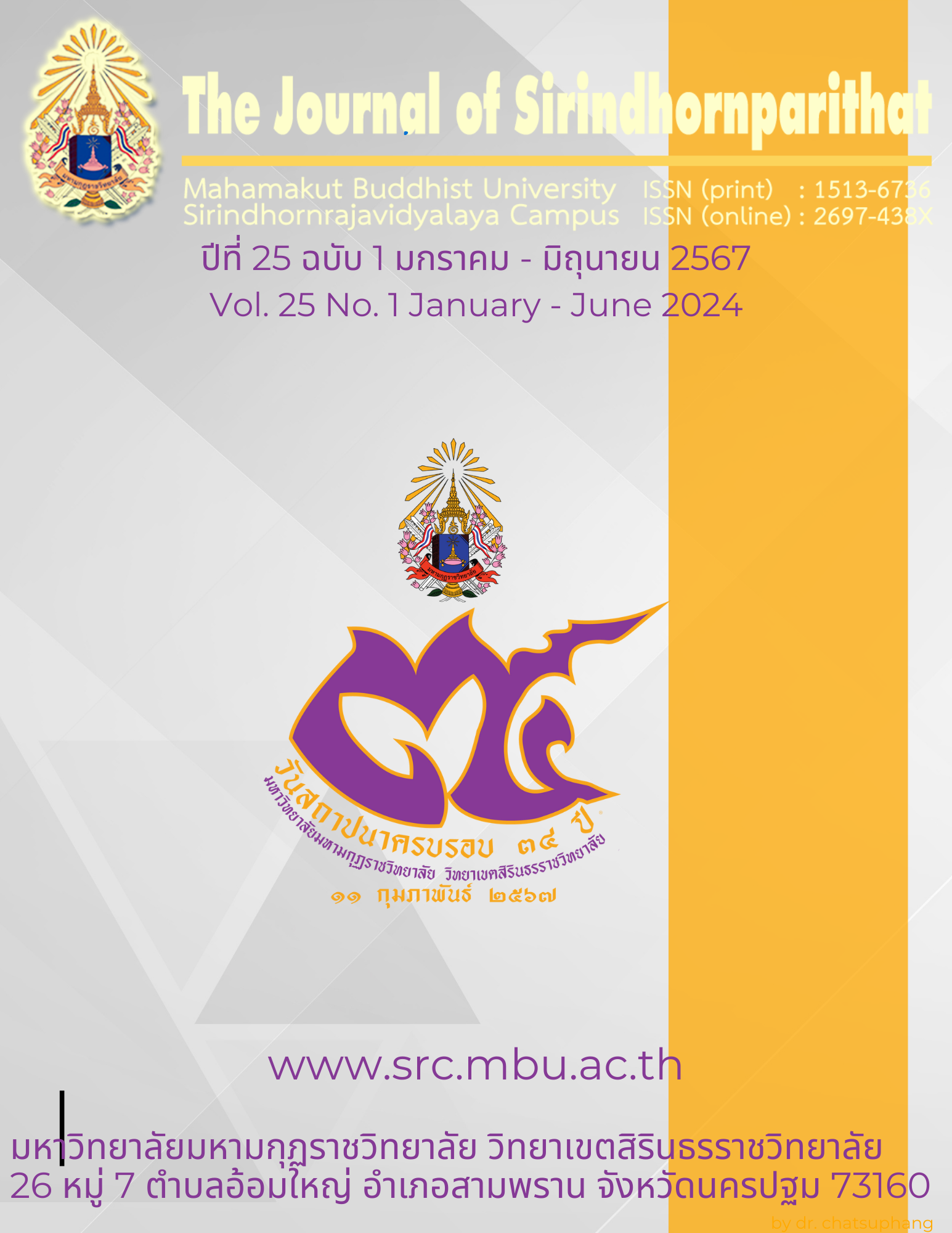The Happiness Enhancement of Personnel in Business Organization
Keywords:
Knowledge Package from the Tipitaka, the Happiness of Personnel, Effectiveness Index, Business OrganizationAbstract
This dissertation contained 3 objectives; 1) study the ways to enhance happiness in the Tipitaka, 2) study the construct of personnel happiness in business organization, 3) developing the knowledge package from Tipitaka to enhance the personnel happiness in business organization, using Exploratory Sequential Design as the method of mixed research, firstly done by qualitative research using documentary analysis, its outcome is happiness knowledge from the Tipitaka. The second step was done by quantitative research to confirm the effectiveness of the knowledge package developed by using the knowledge package for training to the sample group that consists of 30 employees of a private organization. The outcomes were measured by workplace happiness indexes in 9 dimensions before and after the training and periodic post-training follow-up. Statistical measures considered were frequency, percentage, mean, standard deviation, and paired t-test result.
The results revealed that:
- Enhancement of happiness from the Tipitaka, analyzed from Gaṇakamoggallānasutta and Girisutta mentioned to a person who holds unshakable faith in the Buddha’s teaching called Saddhānusārī. The researcher derived at 3 conceptual frameworks; 1) conceptual framework “A Development of Knowledge Package Found in Tipitaka to Enhance the Personnel Happiness in Business Organization”, 2) conceptual framework “A Knowledge Package Buddhist Morality: Achieving growth somatically, 3) conceptual framework “Knowledge Package of Mind and Wisdom Training to Enhance Happiness.”
- Happiness indexes of the employees in 9 dimensions were; happy body, happy heart, happy money, happy brain, happy soul, happy relax, happy family, happy society, and happy work life. After the employees attended the 3-day training “Mindfulness Building according to Saddhānusārī”, it indicates that 67.3 scores of the employees were normal happy and more than before the employees attended training course, it indicated that 46.8 scores of the employees were low happy. By an analysis found that increase scores had statistically significant at 0.001, means that personal in Business Organization after pass this training course can increase positive effect on happiness of employees in the organization.
- Effectiveness Index of the ‘Knowledge Package from Tipitaka to Enhance the Personal Happiness in Business Organization has 27.9%, explain that this training course had positive effect on progress in the development of happiness of employees in the organization.
This research had created a knowledge innovation that combines knowledge of happiness enhancement in Tipitaka with new knowledge for managing of personnel happiness in an organization and ADDIE Model. The researcher names it “A Knowledge Package from Tipitaka to Enhance the Happiness of Personnel in Business Organization”. This training course can increase positive effect on happiness of employees in the organization and providing its manual book in digital format and video clip enable to be downloaded freely, so that organizations, organizational employees, and those who wanted might apply the knowledge package to enhance the happiness in workplace.
References
กระทรวงดิจิตอลเพื่อเศรษฐกิจและสังคม สำนักงานสถิติแห่งชาติ. (2564). สรุปผลที่สำคัญ การสำรวจสุขภาพจิต(ความสุข) ของคนในประเทศไทย พ.ศ. 2563. กรุงเทพมหานคร: ห้างหุ้นส่วนจำกัด บางกอกบล็อก.
พระมหาปิยภัทร์ จิรปุณญโชติ. (2555). “การพัฒนารูปแบบบทเรียนออนไลน์ รายวิชาวัฒนธรรมเพื่อ
ชีวิตสำหรับนักศึกษาระดับปริญญาตรี”. วิทยานิพนธ์การศึกษามหาบัณฑิต สาขาวิชาเทคโนโลยีการศึกษา. บัณฑิตวิทยาลัย: มหาวิทยาลัยศรีนครินทรวิโรฒ.
พระมหาสุพจน์ สุเมโธ (พานทอง). (2546). “ไตรสิกขาสู่การพัฒนาการเรียนรู้”. วารสารครุศาสตร์ปริทรรศ์ฯ. 2(2) : 82-93.
พระมหาสุทิตย์ อาภากโร และคณะ. (2558). “การสร้างและพัฒนาตัวชี้วัดความสุขของประชาชนตามหลักคำสอนของพระพุทธศาสนา”. รายงานวิจัย. สถาบันวิจัยพุทธศาสตร์ มหาวิทยาลัยมหา จุฬาลงกรณราชวิทยาลัย.
มหาจุฬาลงกรณราชวิทยาลัย. (2535). พระไตรปิฎกบาลี ฉบับมหาจุฬาเตปิฏกํ 2500. กรุงเทพมหานคร: โรงพิมพ์มหาจุฬาลงกรณราชวิทยาลัย.
มหาจุฬาลงกรณราชวิทยาลัย. (2539). พระไตรปิฎกภาษาไทย ฉบับมหาจุฬาลงกรณราชวิทยาลัย. กรุงเทพมหานคร: โรงพิมพ์มหาจุฬาลงกรณราชวิทยาลัย.
วัชรพล วิบูลยศริน. (2557). “ประยุกต์ใช้ ADDIE Model ในหลักการออกแบบการสอนบนเว็บ เพื่อการสอน สนทนาภาษาไทยเบื้องต้นสำหรับชาวต่างประเทศ”. วารสารศรีนครินทรวิโรฒวิจัยและพัฒนา (สาขามนุษยศาสตร์และสังคมศาสตร์). 6(12)
ศิรินันท์ กิตติสุขสถิต และคณะ.(2555). คู่มือการวัดความสุขด้วยตนเอง (Happinometer: The Happiness Self Assessment). พิมพ์ครั้งที่1. นครปฐม: สถาบันวิจัยประชากรและสังคม มหาวิทยาลัยมหิดล.
ศิริพรรณ ตันติวิวัฒนพันธ์. (2561). “ศึกษาความสัมพันธ์ระหว่างพฤติกรรมตามหลักไตรสิกขากับความสุขของบุคลากรในองค์กรเอกชน”. วิทยานิพนธ์พุทธศาสตรมหาบัณฑิต สาขาวิชาชีวิตและความตาย. บัณฑิตวิทยาลัย มหาวิทยาลัยมหาจุฬาลงกรณราชวิทยาลัย.
สุพิชญา วงศ์วาสนา. “ปัจจัยผลกระทบทางลบจาก COVID-19 ส่งผลต่อความสุขในการทำงานของพนักงานฝ่ายการโดยสาร กรณีศึกษา บริษัทบางกอกไฟลท์ เซอร์วิสเซล จำกัด (BFS)”. วารสารรัชต์ภาคย์ .15(39) : 15-30.
โสวิทย์ บำรุงภักดิ์. (2563). “การพัฒนาความสุขของคนไทยตามหลักพุทธศาสนา”. วารสารปณิธาน. 16(2) : 128.
สถาบันวิจัยประชากรและสังคม มหาวิทยาลัยมหิดล. (2561). ผลการสำรวจความสุขคนทำงาน(ในองค์กร)ปี 2561 ไตรมาส1 (มกราคม -มีนาคม 2561). พิมพ์ครั้งที่1. นนทบุรี: บริษัท อัพทรูยู ครีเอทนิว จำกัด.
สมเด็จพระพุทธโฆษาจารย์ (ป.อ. ปยุตฺโต). (2562). พุทธธรรม ฉบับปรับขยาย. พิมพ์ครั้งที่ 55.กรุงเทพมหานคร: โรงพิมพ์มหาจุฬาลงกรณราชวิทยาลัย.
Nastasi, B.K. and Schensul, S.L. (2005). “Contributions of qualitative research to the validity of intervention research”. School Psychology. Vol.43 No.3 (2005): 177-195.
Peterson (2003) Peterson, C.. “Bringing ADDIE to Life: Instructional Design at Its Best". Educational Multimedia & Hypermedia. 12(3): 227-241.
TIME Magazine. The science of Meditation, [ออนไลน์], แหล่งที่มา: http://www.chombunghospital.com/cbhsite/index.php/blog/k2/item/11-sci[August 2003].

Downloads
Published
Issue
Section
License
Copyright (c) 2024 Mahamakut Buddhist University

This work is licensed under a Creative Commons Attribution-NonCommercial-NoDerivatives 4.0 International License.
บทความที่ได้รับการตีพิมพ์เป็นลิขสิทธิ์ของ มหาวิทยาลัยมหามกุฏราชวิทยาลัย วิทยาเขตสิรินธรราชวิทยาลัย
ข้อความที่ปรากฏในบทความแต่ละเรื่องในวารสารวิชาการเล่มนี้เป็นความคิดเห็นส่วนตัวของผู้เขียนแต่ละท่านไม่เกี่ยวข้องกับหาวิทยาลัยมหามกุฏราชวิทยาลัย วิทยาเขตสิรินธรราชวิทยาลัย และคณาจารย์ท่านอื่นๆในมหาวิทยาลัยฯ แต่อย่างใด ความรับผิดชอบองค์ประกอบทั้งหมดของบทความแต่ละเรื่องเป็นของผู้เขียนแต่ละท่าน หากมีความผิดพลาดใดๆ ผู้เขียนแต่ละท่านจะรับผิดชอบบทความของตนเองแต่ผู้เดียว



